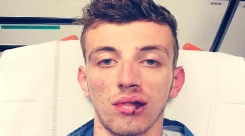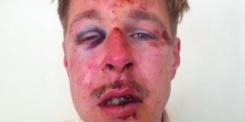BY NATASHA BARSOTTI — As protesters both for and against the French government’s bid to legalize gay marriage again turned out in the thousands in Paris on the eve of Tuesday’s vote on the measure, another gay man has reportedly been attacked, according to media reports. ![]()
French news portal The Local says Raphaël Leclerc alleges he was punched and kicked by three men when he and his partner left a Nice club around 5am on Saturday. The report says Leclerc was beaten unconscious.
“We were not kissing and we were not holding hands; a couple of minutes later there were three, who were shouting ‘Hey gays’ at us, and then they ran at us,” Leclerc alleges, according to the report. Leclerc also told The Local he was asked by his alleged attackers if he was French or Chechen and was jumped after replying French.
Jean-Marie Pottier, of the LGBT Centre for Côte d’Azur, told The Local that “homophobia may not have been the origin of the violence but it played its part.”
This latest incident follows attacks on gay bars in the cities of Lille and Bordeaux, as well as another recent assault on a gay couple who were walking arm-in-arm in Paris. “It’s the face of homophobia,” Wilfred de Bruijn wrote in a Facebook post. De Bruijn said he woke up in an ambulance after the attack, “covered in blood,” missing a tooth and with broken bones around his eye.
Like de Bruijn, Leclerc posted a photo of himself on Facebook in the aftermath of the attack. 

The recent homophobic attacks have been condemned by the leaders of Manif pour Tous, the main campaign group opposed to the proposed law.
There has been an increasingly pointed tone to the rhetoric of those opposed to the government’s bill, with the country’s top Catholic bishop, André Vingt-Trois, warning that the legalization of gay marriage will breed more violence and protest leader Frigide Barjot reportedly saying, “Hollande wants blood” and “he’ll get it.” She later said she went “a bit far.”
French President François Hollande and Prime Minister Jean-Marc Ayrault have condemned the violence, even as they support the right of protesters to voice their perspectives.
“The right to protest is recognized by our constitution and accepted by the French. But no protest must degenerate,” Hollande said last week. Ayrault agreed, saying, “These protests have a right to take place; we are in a republic. But calls for violence, calls to hate, must be condemned.”
The high emotions triggered by the heated debate over gay marriage and adoption were also in evidence in the lower house of the French National Assembly last week when MPs reportedly scuffled for several minutes at the end of a time-limited debate on the bill.
Meanwhile, Agence France-Presse (AFP) reports that National Assembly speaker Claude Bartolone received ammunition powder and a threatening letter calling for Tuesday’s vote to be delayed.
“Our methods are more radical and direct than the protests, you wanted war, you have it,” the letter states. “Allowing marriage for all would be the same as destroying all marriage,” it adds. “If you were to carry on regardless, your political family will have to suffer physically.”
AFP cites a number of reasons for the intensity of the opposition to the Hollande government’s bill, including what it suggests is the political right’s decision to seize an opportunity to put pressure on Hollande’s government after Nicolas Sarkozy’s failure to win reelection and his retirement from politics.
Political analyst Jean-Yves Camus told AFP that the “negative social and economic context favours the spread of discontent, and [Hollande’s] ratings are abysmal.”
If the gay marriage bill becomes law, which is the likely outcome, another protest is being planned for May 26 to call for its withdrawal and for a referendum on gay marriage.
Landing image: Lonely Planet

 Why you can trust Xtra
Why you can trust Xtra


